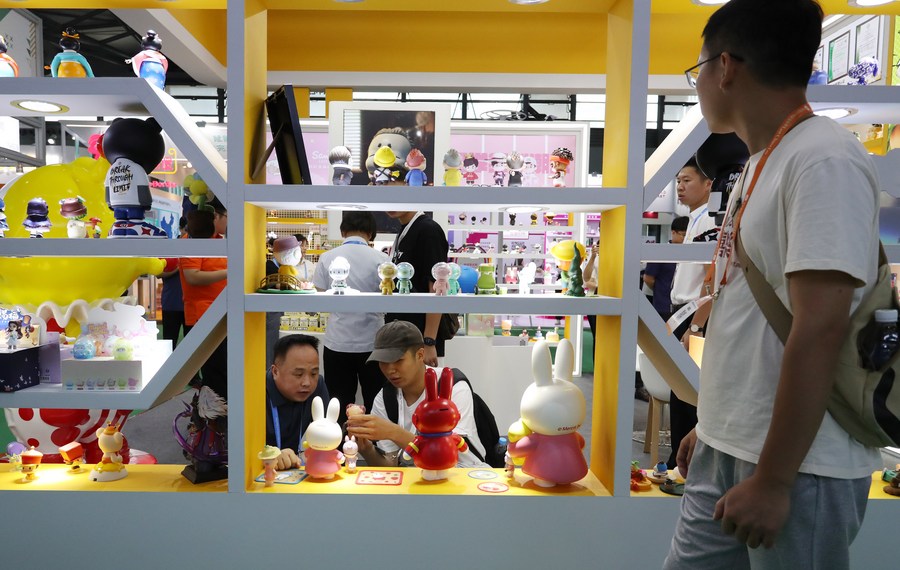Chinese foreign trade companies ascending value chain through innovation

People visit the booth of a toy company during the East China Fair in Shanghai, east China, July 12, 2023. (Xinhua/Fang Zhe)
SHANGHAI, July 17 (Xinhua) -- The 31st edition of the East China Fair, often referred to as a "barometer of foreign trade," was held in Shanghai from July 12 to 15, marking its return to an offline format after three years of COVID-19 disruption.
Being one of the largest trade exhibitions in China, this fair has firmly established itself as a prominent event for the country's foreign trade enterprises. This year's edition attracted nearly 35,000 domestic and international buyers from over 110 countries and regions, according to the organizers.
A diverse range of exhibitors at the fair, encompassing industries such as garment, textile and home products, vividly demonstrates the evolution of Chinese manufacturers that have transcended the pursuit of high-quality commodities. Instead, they have embraced innovation and diligently enhanced the competitiveness of their products, cementing China's role as a key player in the international trade arena.
At the booth of Zhejiang Jiaxin Silk Corp., Ltd., a regular participant in the fair for over 30 years, Wu Huiping passionately introduced their new textile product crafted by interweaving collagen-modified nylon fiber with silk.
"It combines comfort, sun protection and antibacterial properties," said Wu, deputy director of the company's technology center. "The product aligns with the demands of popular outdoor brands in foreign markets."
Wu noted that as early as 2019, their company established an online showroom for garment samples, aiming to facilitate communication with overseas customers. The company has also employed 3D design software to tailor its products according to the varying customer requirements.
"Even amidst the challenges posed by the pandemic, the development and utilization of new technologies have helped us maintain our resilience, resulting in a remarkable 40 percent sales growth in 2022," Wu said with a sense of pride.
Zhejiang Truelove Fashion Home Textile Co., Ltd., another exhibitor at the fair, attracted visitors with their vibrant and intricately patterned blankets.
Lin Danping, the company's business manager, revealed that their upcoming "Industry 4.0" intelligent factory, with an investment of 1.28 billion yuan (about 179.46 million U.S. dollars), is set to begin production later this year.
With an estimated annual output of 70,000 tonnes and a cost reduction of 40 percent, the factory aims to enhance efficiency while expanding into emerging markets, Lin said.
Nick Evans, a British entrepreneur with more than 40 years of experience in sourcing from China, affirms that the country's foreign trade has undergone a remarkable transformation.
"Chinese foreign trade companies are now developing an increasing number of products independently. While maintaining cost-effectiveness, they also incorporate ingenious ideas to meet the demands of the new generation of consumers," he said.
The turnover of the four-day fair has reached 2.18 billion U.S. dollars, the organizers said, citing preliminary statistics.
China's foreign trade maintained steady growth in the first half of the year, with the total goods imports and exports reaching 20.1 trillion yuan, according to data released by the General Administration of Customs. It is the first time China's goods imports and exports exceeded 20 trillion yuan in the January-June period.
This impressive growth is attributable not only to Chinese companies embracing technological innovation but also to new policies introduced by the central and local governments to improve the business environment.
For example, the State Council in April issued a guideline document to promote the stability of its foreign trade scale and to improve its structure, and the resumption of offline exhibitions has been spearheaded by the Ministry of Commerce.
Amid efforts to stabilize trade and improve its structure, the Ministry of Commerce will make better use of major trade fairs, support trade enterprises to attend overseas fairs, enhance the development of the country's processing trade, and promote the accelerated development of new foreign trade business models, said ministry official Xiao Lu at the 31st East China Fair.


